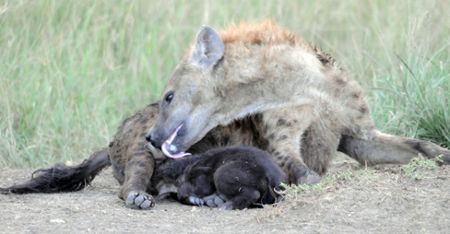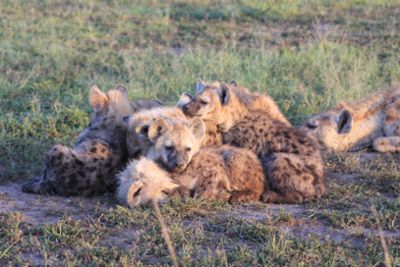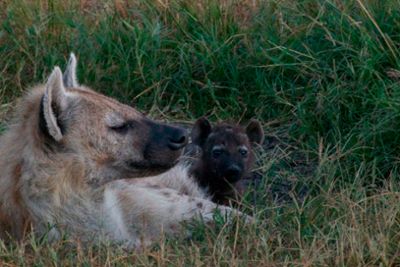Hyena behavior inside and out
At The Maasai Mara National Reserve in Kenya, often referred to as the Mara, a combination of old-fashioned doggedness in field observations and cutting-edge DNA sequencing technology is giving scientists new and extraordinary insights into the development of mammalian behavior.

The Mara is one of the most diverse and important ecosystems in Africa. It sets the stage for a natural wonder of the world, Africa’s Great Migration, the annual movement of millions of zebras and wildebeest across the grasslands. It’s no wonder that predators like the hyena also live out their lives in the Mara, providing one of the most important settings for field studies on the planet.
Michigan State University Distinguished Professor Kay Holekamp and her students have been observing hyenas as part of The Maasai Mara Hyena Project for more than 30 years, following, tagging, sampling blood and feces, and amassing a rich dataset helping to answer questions previously thought impossible outside the lab. Questions like, how do hyenas inherit their mothers’ social networks? What role do parasites play in interactions between hyenas and lions? And, most recently, are there links between hyenas’ early social experiences and their stress as an adult?

The latter is the basis for an exciting new study published in Nature Communications co-authored by Holekamp and led by former MSU Department of Integrative Biology Ph.D. student Zachary Laubach.
“The focus of my research interests falls under the umbrella of developmental plasticity, or the ways that environmental and social experiences during one phase of life tend to cause changes that persist and have measurable effects later in life,” said Laubach, now a postdoctoral researcher at the University of Colorado, Boulder.
For decades, psychologists have explored the theory that early life experiences impact adult behavior and health. In the 1960’s, Harry Harlow’s experiments with rhesus macaques established a causal link between maternal care and behavioral development in primates, but that study involved extreme isolation and deprivation. The seminal studies of David Barker in the 1970s and 80s linked the very earliest experiences of life—in the womb and infancy—to chronic-disease risk later in life and gave birth the field of study known as the Developmental Origins of Health and Disease (DOHaD).
But it is extremely difficult to observe links between maternal care and early social relationships with physiology, behavior, survival and reproductive success late in life in the wild. It would take years of painstaking research following hundreds of hyenas from their birth in the den until their death in the wild—exactly the kind of research compiled by the Hyena Project.

“One of the greatest things about long-term studies like ours is that they enable us to assess the lifelong consequences of variables acting on long-lived mammals very early in their lives,” Holekamp said. “The cool and novel work that Dr. Laubach and colleagues have done here combines behavioral data from observations of mother-infant pairs and entire social networks among young hyenas in the Mara with very sophisticated molecular genetic analysis of patterns of gene expression and analysis of stress hormone concentrations later in life, thus revealing important long-term effects of the early social environment.”
The three-decades long field study data were connected to individual fecal glucocorticoid metabolite samples (fGCMs), a non-invasive and ground-breaking monitoring technique in wildlife management for studying the physiological response of wildlife to a variety of stressors.

Zeroing in on two windows of hyena early development—up to a year old--when parents are expected to have more influence, and 1-2 years old, when the “teenage” hyena establishes social networks—the scientists discovered that less maternal care during the infant’s first year of life and less social connectedness once they are independent of the communal den were associated later in life with higher concentrations of stress hormones.
“What we found was that individuals who were better connected, or had lots of ‘friends’, had lower baseline stress hormones,” Laubach said. “While these hormones do things like mobilize energy that can save your life if under attack, chronically elevated stress hormones have been linked to lot of negative health outcomes.”
Next, the scientists wanted to see if they could mechanistically link positive early-life social experiences to these reduced stress hormones. In other words, did maternal care and teenage social networks make lasting changes to hyena DNA that played out later in life? The answer was yes. Less maternal care and less social connectedness early in life led to less global DNA methylation.

“What you experience as a kid is fairly disconnected from your life as an adult especially in long-lived species with protracted development, so we measured DNA methylation, or epigenetic markers that are added on top of the DNA,” Laubach explained. “They don’t change the underlying nucleotide sequence, but they are sensitive to environmental factors and modifiable by the environment, so they were a tempting mechanism to investigate in this situation.”
Using a number of molecular biology techniques, including next generation DNA sequencing, they found that markers with respect to maternal care and stress hormones were related to genes found in humans to be associated with aging and immune function.
“Our data suggest that maternal care early in life seems to matter, and that these social networks, particularly in the subadult (teenage) phase, matter in terms of DNA methylation and stress hormone concentrations,” said Laubach, whose pioneering research will launch future investigations into maternal care and the immune system. “There’s some interest to dive deeper into the mechanism we found here and relate early-life social experiences to aspects of immune systems and ultimately to fitness.”
Banner image: A lone hyena gazing out across the savannah at the Maasai Mara National Reserve in Kenya. Credit: Zachary Laubach